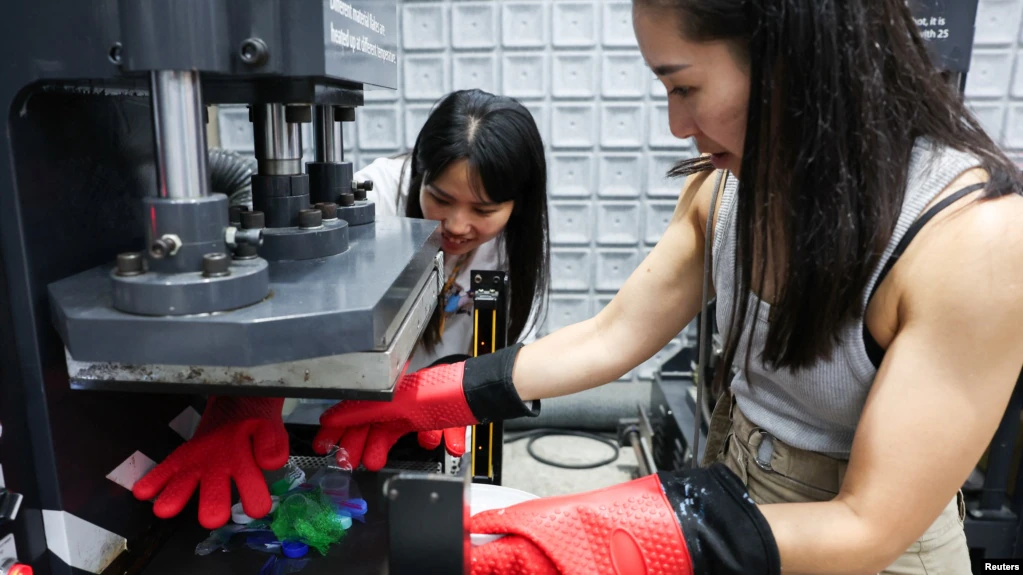
Weekly News Digest
ニュースディスカッション教材
In Taiwan, Turning Trash into Sunglasses
In Taiwan, Turning Trash into Sunglasses
今回は、台湾で注目を集める環境保護のユニークな取り組みをご紹介します。不要になったプラスチック廃棄物を、たったの2時間でおしゃれなサングラスに変身させる体験ができるそうです。最近では、「sustainable(持続可能な)」という言葉をよく耳にしますが、この取り組みはまさにその考え方にぴったりですね。ゴミを減らすために、私たちの日常生活でできることを話してみましょう。

1.Article
Directions: Read the following article aloud.
A workshop in Taipei, Taiwan, is giving new life to bottle caps, food packaging, old toys, and other kinds of plastic waste.
The zero-waste workshop known as Trash Kitchen gives people hands-on experience in the recycling process.
People take plastic waste, then soften and shape it into a pair of sunglasses within two hours.
Arthur Huang started the company that holds the workshop. He spoke to Reuters news agency. He said: "What we are trying to show in the Trash Kitchen is to let you see, feel, touch within minutes how this process can actually work without secondary pollution, and you can actually turn it into something of value directly in front of you."
Huang is the founder of Miniwiz. The company recycles waste material into goods that people want to buy. Miniwiz also produces tiles, bricks, hangers and other daily necessities from plastic and organic waste.
Huang said the company uses a machine it developed in 2017 called a "miniTrashpresso." The machine processes the waste material for a new use.
Kora Hsieh is editor-in-chief for fashion magazine Harper's Bazaar Taiwan. Hsieh said the project making sunglasses is a good way to bring attention to sustainable fashion.
"I think environmental protection and fashion still have a long way to go. As for consumers, it is important for them to get first-hand experience, so a workshop like this is very helpful," she said.
People taking part in the workshop said it made them think twice about producing trash and made them pay more attention to reusable goods.
"I have two children. I need to think about their future," said business owner Debbie Wu.
"If you throw away trash without thinking, you kick the problem down the road. So, if everyone can do their best, recycle and use less plastic, that will make a big difference," Wu said.
Data from the Ministry of Environment estimates that Taiwan produced a record 11.6 million metric tons of waste in 2023. More than 6 million tons of
that waste was recyclable.
I’m John Russell.
The zero-waste workshop known as Trash Kitchen gives people hands-on experience in the recycling process.
People take plastic waste, then soften and shape it into a pair of sunglasses within two hours.
Arthur Huang started the company that holds the workshop. He spoke to Reuters news agency. He said: "What we are trying to show in the Trash Kitchen is to let you see, feel, touch within minutes how this process can actually work without secondary pollution, and you can actually turn it into something of value directly in front of you."
Huang is the founder of Miniwiz. The company recycles waste material into goods that people want to buy. Miniwiz also produces tiles, bricks, hangers and other daily necessities from plastic and organic waste.
Huang said the company uses a machine it developed in 2017 called a "miniTrashpresso." The machine processes the waste material for a new use.
Kora Hsieh is editor-in-chief for fashion magazine Harper's Bazaar Taiwan. Hsieh said the project making sunglasses is a good way to bring attention to sustainable fashion.
"I think environmental protection and fashion still have a long way to go. As for consumers, it is important for them to get first-hand experience, so a workshop like this is very helpful," she said.
People taking part in the workshop said it made them think twice about producing trash and made them pay more attention to reusable goods.
"I have two children. I need to think about their future," said business owner Debbie Wu.
"If you throw away trash without thinking, you kick the problem down the road. So, if everyone can do their best, recycle and use less plastic, that will make a big difference," Wu said.
Data from the Ministry of Environment estimates that Taiwan produced a record 11.6 million metric tons of waste in 2023. More than 6 million tons of
that waste was recyclable.
I’m John Russell.
Angie Teo and Ann Wang reported on this story for Reuters. John Russell adapted it for VOA Learning English.
Source:In Taiwan, Turning Trash into Sunglasses
VOA
本教材は、the U.S. Agency for Global Mediaより許諾を得て、産経ヒューマンラーニング株式会社が編集しています。
テキストの無断転載・無断使用を固く禁じます 。